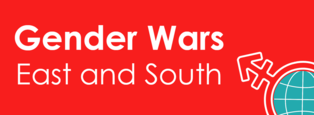In-Person Follow-up on "Liberal practices and conservative global knowledge flows"
Following our roundtable on “Liberal practices and conservative global knowledge flows”, we continued the conversation at our partner institution, the Department of Ethology and Cultural Anthropology of the University of Warsaw. Natalia Jarska, Agnieszka Kosiorowska, Agnieszka Kościańska, and Natalia Pomian described the research they had conducted within the “Catholicising Reproduction, Reproducing Catholicism: Activist Practices and Intimate Negotiations in Poland, 1930–Present” (“Cathorep”) project. The presentation was opened by Agnieszka Kościańska, PI of “Cathorep” and an International Co-Investigator in “Gender Wars”, who discussed the religious landscape in Poland. According to official statistics, 32.4 million of the 38.2 million people living in Poland belong to the Church. Furthermore, conservative Catholic ideas are now supported by the state, as illustrated by limited access to contraception and the most restrictive anti-abortion law in Europe, enacted in 2020, which decrees abortion illegal even when a foetus is malformed. That same year a bill was presented to parliament proposing the illegalization of sex education and the Polish media relentlessly present feminists and LGBTQ+ activists as enemies of the nation and family. However, the majority of Polish citizens do not strictly adhere to Catholic principles and lead relatively secular lifestyles: as the country’s low birth rate of 1.38 demonstrates, they make use of various birth control methods. It is the questions about the relationship between Catholicism and reproduction raised by this discrepancy between Polish Catholic principles and practices that formed the focus of the Cathorep project. What influence does the legal framing of birth control and particularly abortion have on social acceptance? Was Poland under socialism disconnected from the flows of global conservative knowledge? And if not, how did their presence manifest and take effect? How can we make sense of present-day tensions surrounding sexuality and reproduction and the popularity of anti-gender rhetoric? It was in order to answers these questions that the “Cathorep” research team conducted their historical and anthropological research.
Natalia Jarska, a historian at the Polish Academy of Sciences, then described the historical component of the project, recounting the processes of liberation in gender, sexuality, and reproduction experienced in post-WWII Poland through to the 1980s. Despite the vast majority of Polish people affirming their Catholicism during this period, not only was abortion legal and the leading method of birth control, pre-marital sex, condemned by the Church, became increasingly socially acceptable.
Agnieszka Kosiorowska and Natalia Pomian then discussed the in-depth interviews they had conducted with Polish Catholics of various generations. These illuminated the liberalizing trends that took place among the faithful. Many of the interviewees, for whom faith was a key element of their lives, maintained that the Church should not impose Catholic ideas on others. Most believed abortion was a sin, but not that it should be banned; some had even taken part in demonstrations against the further restrictions to access imposed in 2020. In order to reduce abortion rates, many suggested, we should support pregnant women and improve sex education.
Finally, Agnieszka Kościańska addressed the divergence between the liberal attitudes of Polish citizens as a whole and the conservative politics of the state. She underlined the roles of transnational conservative networks that have been developing since the 1970s, as well as those of local conservative experts. Even before the democratic transition, prominent Catholic doctors were promoting Catholic conservative values, through such practices as humanizing embryos from the earliest stages of pregnancy.
Throughout this discussion, panellists and audience members pondered both the future of reproductive rights and religion in Poland, and how to translate the results of the Cathorep project into emancipatory politics to reduce the impact of conservative attacks on “gender ideology”.




